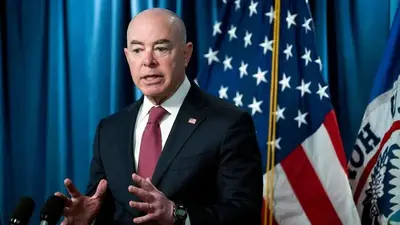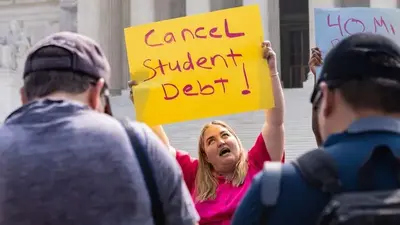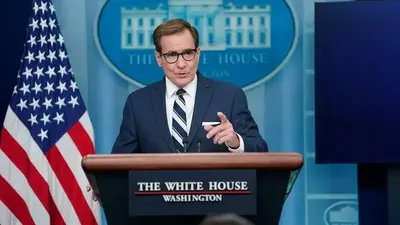Politics
The government can help solve the Black male teaching shortage, advocates say
As a novice educator, Dr. Phelton Moss won back-to-back teacher of the year awards about a decade ago in Greenwood, Mississippi. Despite his early success, he said he was financially struggling to live on his salary, which started at $32,000, and took out short-term, high-interest "payday" loans to make ends meet.
"As a man, I didn't want to call home and be like, 'Hey -- I can't take care of my bills." Moss, now a professor at American University and an NAACP education fellow, told ABC News.
Moss isn't alone. Over months of reporting, roughly 20 Black male teachers and former teachers at public, charter and private PK-12 schools across the country have told ABC News that they feel underappreciated and overstretched -- with their numbers in the profession already small and appearing to dwindle, according to experts -- as part of a larger teacher shortage in more than 40 states, as well as Washington, D.C., and the U.S. Virgin Islands.
According to many, they also feel like society has unrealistic expectations for them, such as being mentors -- or even father figures -- to young men in their schools.
MORE: Amid teacher shortage, Black male educators point to why there aren't more of them

Recent exit interviews and internal surveys suggest pay is a leading factor for young Black teachers' departure, according to Elisa Villanueva Beard, the CEO of Teach for America (TFA), a nonprofit that develops educators and recruits them to low-income schools.
"If I was able to make more money as a Black man and also be able to take on a leadership position while in the classroom, I would have stayed in the classroom a lot longer," said Moss, who was recruited through TFA. "Our compensation, our incentive structure in this country, does not yield this kind of work."
Some politicians in Washington want to change that.
What lawmakers are proposing
Moss rose from the classroom to the state's youngest principal to the Mississippi Department of Education in just six years.
After leading his state's educator recruitment and retention programs, he headed to the nation's capital to work as a senior policy adviser for Rep. Frederica Wilson, D-Fla. There, he wrote the American Teacher Act in 2022 to incentivize states to increase starting salaries to at least $60,000.
"I directly worked on that bill thinking about Black men who say, 'I don't make enough money to be able to take care of family and be a classroom teacher,'" Moss said.


The Republican-led House did not take up the proposal, co-sponsored by Wilson and Rep. Jamaal Bowman, D-N.Y., in conjunction with the nonprofit Teacher Salary Project, because conservatives on Capitol Hill largely view teacher salaries as a state issue.
In 2020, Wilson introduced the U.S. Commission on the Social Status of Black Men and Boys (CSSBMB), which studies the disparities Black men face in education and other areas of life, such as health, employment and criminal justice.
MORE: Lawmakers propose raising teachers' minimum salaries to $60K to stem 'mass exodus'
Wilson's commission builds on Del. Eleanor Holmes Norton's D.C. Commission on Black Men and Boys. According to Norton, whose mother was an educator, one of its aims is to help Black men find a place in the classroom.
"I was astounded to learn that only 1% of public school teachers are Black men," Norton told ABC News, adding, "That is infinitesimal and it's harmful to children."

House Education Committee Ranking Member Bobby Scott, D-Va., told ABC News that any "serious" teacher shortage discussions should start with salaries. And Chairwoman Virginia Foxx acknowledged Black men should be paid more. The chairwoman is against Congress wading into district-level matters, though.
"I don't support [raising teacher salaries] at the federal level," Rep. Foxx, R-N.C., said. "That's not our job. Teachers have to be valued more at the state and local level."
Meanwhile, the University of California at Berkeley's Dr. Travis J. Bristol suggested Black men's success in the classroom shouldn't lie solely at the feet of lawmakers and district leaders. Both he and Moss believe federal agencies can work to improve the pipeline that trains future instructors.
Broader government solutions
One way Black male teachers could see their numbers increase, Moss said, is with help from the remaining money in the American Rescue Plan's Elementary and Secondary School Emergency Relief (ESSER) Fund, launched during the COVID-19 pandemic for school communities to use at their discretion through September 2024.
According to federal statistics, about 55% of the overall $190-plus billion had been spent as of this summer. (Due to a reporting lag, experts suggest current spending is closer to 75%, which is trending toward the expected pace relative to the grant eligibility period.)
Moss said that Black men who volunteer during local extracurricular activities are more likely to take teaching positions at the schools. So schools could use some of the billions of dollars left in the ESSER to fund those positions, he said.
"It gets them [Black men] closer to the school building, which in turn begins to wet their appetite and [they say], 'Hmm, I may consider teaching,'" Moss said. "There's something about running an after-school chess club, there's something about coaching a summer league basketball team, there's something about that experience that actually gets Black men into teaching."
Bristol said that the government can't solve the problem without addressing how its roots can stretch back years into a person's life. The U.S. Education Department's Office for Civil Rights found racial disparities in discipline start during the earliest years of school. In 2014, Black children made up 18% of preschool enrollment -- yet they accounted for nearly half of the preschool kids who were suspended more than once.
Programs targeting Black men and boys are immediate actions that the federal government can enact at the agency level, Bristol and Moss said.
Both the U.S. Education and Labor departments, according to Bristol, have the ability to rewrite the narrative by prioritizing Black youth.
"The Department of Education could make a call for school districts, local education agencies (LEAs), or teacher preparation programs, who have found promising strategies for reducing suspensions of Black boys," Bristol said. "Black boys are suspended because adults don't know how to create the conditions to support them, so the Department of Education can create a grant competition to do some capacity-building work with teachers, right, for the adults in the system to think about how to reduce out-of-school suspension for boys of color."
A Department of Education spokesperson told ABC News that evidence suggests the overuse of exclusionary practices is associated with a poor school climate, which can ultimately foster distrust and lead to poorer educational outcomes.
"The Department continues to encourage states, districts, and higher education institutions to use federal resources and investments to elevate the teaching profession by recruiting and retaining a diverse workforce and to provide educators with training, coaching, and support [that] can help them effectively manage class behavior, ensure students are engaged, and help them to build trusting relationships with all students and their families," the spokesperson said.

In addition, Bristol said, the Department of Labor's summer youth programs should market the teaching profession to young boys as work experience.
"We know that when Black male students have an early experience in teaching, they're more likely to go into teaching," he said at a Capitol Hill briefing on Black men and boys held by the CSSBMB earlier this year.
A Department of Labor spokesperson said the government's Job Corps program does not offer any such opportunities for young people, does not offer an education curriculum and there are no registered apprenticeship programs specifically for summer teaching experience.
White House initiatives
"Black male educators are a priority," said Alexis K. Holmes, the executive director of the White House Initiative on Advancing Educational Equity, Excellence, and Economic Opportunity for Black Americans.
The executive branch is taking charge in working to bring more Black teachers into schools, according to the Biden administration. Holmes said the White House's Augustus F. Hawkins Program is one resource.
The Hawkins program is issuing grants for teacher training programs at historically Black colleges and universities and minority-serving institutions, and the program has gotten a robust response after several years without funding.
Education experts believe HBCUs are a primary solution for cracking the code on staffing disparities. The schools graduate the most Black professionals -- from doctors to teachers to Supreme Court justices -- across the board, according to the United Negro College Fund and Thurgood Marshall College Fund.
The White House's HBCU-specific initiative uses National HBCU Week programming each fall to recruit and retain Black teachers. Dietra Trent, executive director of the White House's initiative on HBCUs, said she recognized there's a role model problem for aspiring Black male educators.
"It is not unusual for the majority of our students [Black ones in particular] to go through their entire K-12 system and not see a Black teacher and particularly a Black male teacher," Trent said. "I would say that a large part of why we're not seeing a lot of Black males go into this profession is because there are not a lot of role models to point to."
Decades of barriers
The problem with Black male recruitment and retention, experts say, is decades-old.
Dr. Leslie T. Fenwick, author of "Jim Crow's Pink Slip: The Untold Story of Black Principal and Teacher Leadership," said the Black male teacher pipeline was weakened after white backlash to the Supreme Court's Brown v. Board of Education ruling in 1954.
Shortly after, an exodus, particularly of Black male principals, led to the widespread shortages of Black men in education, Fenwick said.
MORE: Few Black male teachers are in US classrooms. These programs are changing that.
More recently, progress relating to closing the gap has been held up by unrealistic educator credentialing, according to Moss.
"Much of our licensing, credentialing, structure in this country are based on licensure exams that are overwhelmingly biased and racist, which often precludes Black and brown [teachers] and, in this particular conversation, Black men out of the teaching profession," he argued.

But National Association of Black Male Educators Founder Rictor Craig cautioned that society isn't fully aware of or concerned by the need to stop the shortage.
"I am still figuring out how we fix this -- the belief that Black and brown boys and men are worth it," Craig told ABC News, adding, "We can throw money at this all day. If nobody believes deeply that I should be invested into, the outcomes are going to be the same."
Craig runs Statesman College Preparatory Academy for Boys in D.C. and his organization is in "many levels" of conversations with federal officials and advocacy groups on this issue.
"We need to start having real conversations around, you know, the trauma that's endured by Black and brown boys in schools," he said about the problem. "There's a reason why there's not a significant amount of Black and brown men teaching in schools. There's a reason for that. And if we don't mine for that reason and then bring solutions to that, we're simply perpetuating over and over again what has already been created."

With increased awareness, Craig also hopes to see investments in funding to help retain the teachers who are in the profession.
"My argument is: a really, really, really good school community with great resources -- not many teachers run from that," he said, calling a strong school community and culture the recipe for success.
Though Craig doesn't see salary as the No. 1 barrier for retaining Black men in the profession, it is vital. Ultimately, while it may be up to the states, Moss stressed a dramatic shift in pay could encourage more Black men to stay.
"If the federal government does not intrude and support raising salaries, then these underresourced and underserved children won't have access to Black men who say, 'I'm not going to teach here because you can't pay me enough,'" he said. "Because of the way we finance our education system, systems cannot accrue enough money to pay Black men the wage that they want to be a classroom teacher."
-
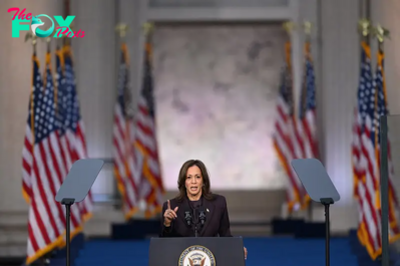
 Politics51m ago
Politics51m agoRead Vice President Kamala Harris’ Full Concession Speech
-

 Politics51m ago
Politics51m agoThe Democrats’ Blame Game Begins
-

 Politics6h ago
Politics6h agoHere Are the Historic Wins of the 2024 Election
-

 Politics6h ago
Politics6h agoWhat Trump’s Win Means for His Legal Cases
-
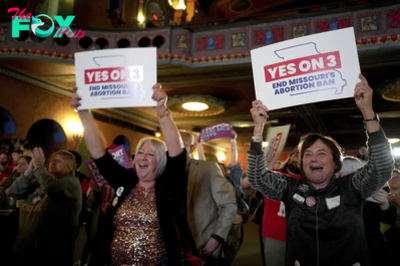
 Politics12h ago
Politics12h agoHow the 10 States’ Abortion Ballot Initiatives Fared in the 2024 Election
-

 Politics12h ago
Politics12h agoHow World Leaders Are Reacting to Trump Winning the U.S. Presidential Election
-

 Politics17h ago
Politics17h agoDonald Trump Wins 2024 Election
-

 Politics17h ago
Politics17h agoTrump Declares Election Victory in Speech to Supporters
